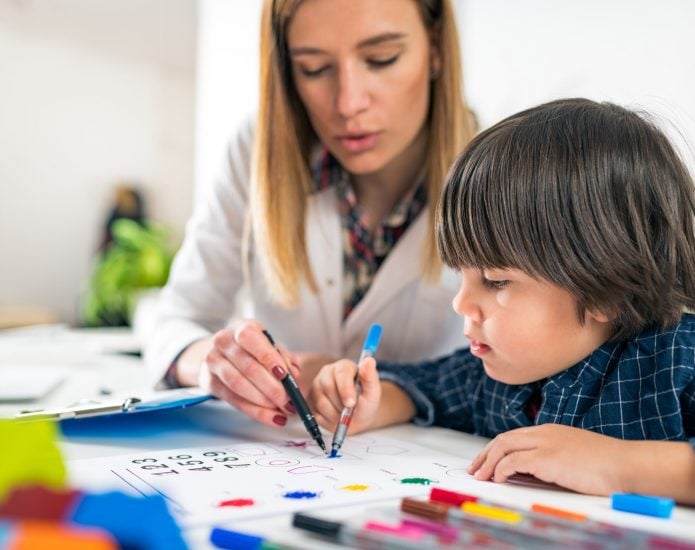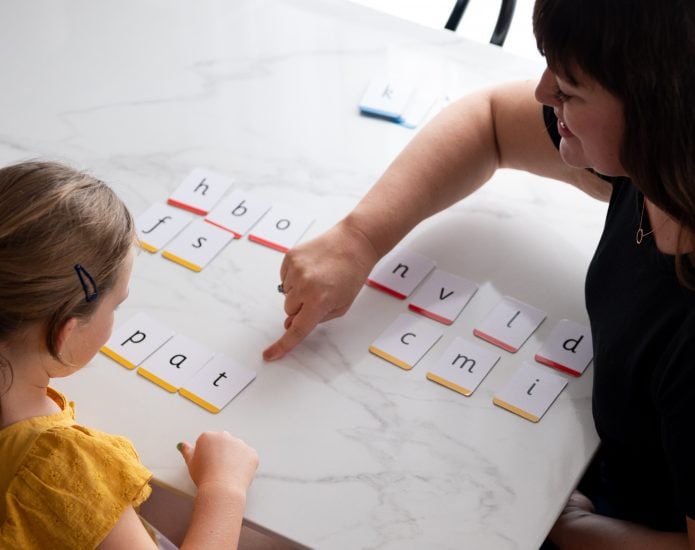Learning to read is one of the first skills children are taught when they start school. All children learn to read at a different rate and may struggle with reading for a number of reasons. If your child has more significant difficulties reading and spelling than others their age, despite frequent and consistent practice, they may be showing signs of Dyslexia.
What is Dyslexia?
Dyslexia is a specific learning disorder (SLD) characterised by persistent difficulties with reading accuracy (known as decoding) and fluency and can be accompanied by challenges with spelling (known as encoding). It is a neurobiological condition that affects the part of the brain that processes language. Dyslexia is not a reflection of intelligence and is not linked to vision impairments, so children with Dyslexia may achieve well in other academic areas.
Dyslexia causes difficulties with identifying letters and their relationship to spoken sounds, which leads to slow reading and poor accuracy. The ability to link spoken sounds with written letter symbols is crucial to reading, writing and spelling. Learning to read and write is a slow process, because written letters have no direct and obvious correlation with their sounds so for children who have Dyslexia and cannot create this link, reading becomes very difficult.
It’s estimated that around one in 10 people have Dyslexia. It is a lifelong condition with no cure, but with early diagnosis, intervention and specialised education programs, children with Dyslexia can learn to read alongside their classmates.
Signs of Dyslexia in Children
Signs of Dyslexia can be difficult to spot in children and as a result may go undiagnosed. Children and young people with Dyslexia can display some of the following characteristics.
Signs of Dyslexia in the early years
It can be difficult to recognise any signs of Dyslexia before your child enters school and receives structured teaching in reading skills, but some early clues may indicate the potential for difficulties developing reading and spelling skills:
- Late talking and/or learning new words slowly.
- Problems with pronunciation, such as reversing sounds in words or confusing words that sound alike.
- Being unable to recognise letters in their own name.
- Mispronouncing familiar words or using “baby talk”.
- A family history of reading and/or spelling difficulties (Dyslexia has a genetic component and often runs in families).
Signs of Dyslexia in the first years of school
Once your child reaches school age, Dyslexia signs and symptoms may become more apparent. Signs may include:
- Difficulty sounding out basic words like ‘cat’, ‘map’, ‘nap’.
- Not having a strategy for reading new words.
- Not associating letters with sounds, such as the letter ‘b’ with the “b” sound.
- Difficulty seeing (and occasionally hearing) similarities and differences in letters and words.
- Difficulty spelling.
- Spending an unusually long time completing tasks that involve reading or writing.
- Avoiding reading out loud or any activities that involve reading.
- Complaining about how hard reading is.
Many teachers are not specifically trained to recognise the signs of Dyslexia. Children who are intelligent and participate fully in class often slip through the cracks because their reading challenges are supported by their strengths in other academic areas.
Signs of Dyslexia in primary school and high school
As children progress through school, signs can include some of the following:
- Difficulty reading correctly and consistently.
- Difficulty spelling correctly and consistently.
- Avoiding activities that involve reading.
- Spending an unusually long amount of time completing tasks that involve reading or writing, including tests.
- Reduced vocabulary in writing
- Low self-esteem that may not be immediately visible.
How is Dyslexia diagnosed?
For children with learning difficulties, the earlier their receive intervention, the better. Dyslexia can be hard to diagnose unless the signs are severe. Start by reaching out to your child’s school to get the teacher’s opinion. If your child’s reading level is well below the expected for their age, or you notice any of the above signs of Dyslexia, then you should consult a GP or paediatrician. A GP or paediatrician can perform ear, eye and neurological tests to rule out other possible causes of your child’s reading challenges and refer the child for a formal assessment by a psychologist.
Understand that it takes time to make a diagnosis of Dyslexia. For your child to get a definitive diagnosis of Dyslexia, a full evaluation by a psychologist is required. The main part of this will be an educational assessment. In addition, it may include questions about your child’s family history and home literacy environment.
The psychological assessment may include testing a range of factors including:
- cognitive (thinking) skills
- memory
- vocabulary
- literacy skills
- intellectual ability
- information processing
- psycholinguistic processing.
The assessment can only be undertaken if the child has been experiencing the problems with reading and spelling for at least six months and has been supported by their teacher using effective reading approaches. For a psychologist to give a diagnosis of Dyslexia, the child’s difficulties in reading and spelling words accurately and fluently must be greater than difficulties in comprehension, writing or mathematics. Concurrent difficulties in these areas may lead to an alternate diagnosis, such as a Specific Learning Disorder with impairment in reading.
An evaluation by a speech pathologist may also assist.
Support for Dyslexia
While there is no cure for Dyslexia, it can be overcome. There’s no known way to correct the underlying brain function that causes Dyslexia, however with the right interventions and supports, children with Dyslexia can become highly successful students and adults. The sooner this intervention begins the better.
Psychological assessment will help your child’s teacher/s develop a suitable intervention program. Techniques may include:
- A systematic synthetic phonics-based reading program that teaches the link between spoken and written sounds.
- Special arrangements with the child’s school, for example taking oral tests instead of written tests.
- The use of assistive technology, such as audio books, scanning pens and text to speech.
Tutoring with a specialist educator may also be needed to support your child’s classroom teaching. Early intervention programs usually focus on phonological (word sound) awareness and direct teaching of letter-sound correspondences to read and spell words, known as synthetic phonics.
Causes of Dyslexia
The exact causes of Dyslexia remain unknown, however it does tend to run in families. Research suggests that it appears to be linked to certain genes that affect how the brain processes reading and language. The main challenges are with processing, remembering and correctly sequencing the sounds in words, which are the key elements in learning to read and write. This is why people with Dyslexia have difficulty with written language while their oral (speaking and listening) language abilities are fine.
Supporting children who show signs of Dyslexia
Remember, as a parent, carer or teacher of a child with Dyslexia, you are their most important ally and advocate. There is a lot you can do to improve their academic success and sense of self-worth. Emotional support and opportunities for achievement in activities that do not involve reading are important for children with Dyslexia.
Important things you can do include:
- Intervene early – as soon as you or your child’s teacher may suspect there is an issue with their reading or spelling, put a plan in place, such as a synthetic phonics intervention, and have them assessed so that you have a clear understanding of their challenges and needs.
- Help your child understand Dyslexia – explain to your child what Dyslexia is and that it is not a personal failure. Your child will be able to deal with things much better if they understand it is nothing to do with intelligence and is something they can overcome.
- Read aloud with your child – practice identifying letters and matching with the corresponding sounds.
- Create a productive home learning environment – provide a quiet, organised place for your child to work, and designate a study time. Limit screen time and make sure your child gets enough rest and eats regular, healthy meals.
- Communicate frequently with your child’s teachers – check on their progress in class as well as finding out what you can do at home to further support them. Advocate for your child if you feel extra support or special teaching arrangements may help them.
- Be supportive – trouble learning to read may affect your child’s self-esteem. Encourage them by praising the small steps they make in their school work, and their talents and strengths.
- Consider assistive technology to support your child’s participation, speech to text and text to speech helps your child to maintain learning even while they are learning to read and spell.
- Join a support group – this can help you get in touch with parents whose children face similar learning difficulties. Support groups can provide useful information and emotional support. Your doctor may be able to recommend support groups in your area.
Helpful Resources
How Learning Links Can Help
Learning Links offers a range of services that can support with diagnosis and strategies to support children with Dyslexia and other reading difficulties.

Speech Therapy
Learning Links’ speech pathologists support children’s development of speech and language to support literacy development.



